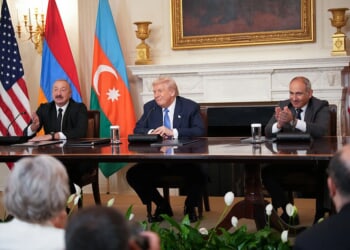Wilfred Aspinall is a member of Hitchin Conservative Association, a CPF Eastern Regional Ambassador and Former Chair – Forum in the European Parliament for Construction
During the next few months we have to consider how we are to promote defence spending as part of an urgent national project. Our defence spending will need to increase in order that we are able to defend ourselves, also acting as a deterrent.
The U.K. has committed to spend equivalent of 5 per cent of GDP on defence spending. The decision on this spending cannot be kicked down the road for all the reasons that the reader knows. We have to provide the funds. We have to have a well thought out plan. We have to act now in order to meet a deadline.
That involves not just the size of our armed forces but also the development of our indigenous defence industry.
The armed forces are a priority to be enlarged in all aspects and prepared for all eventualities including actual combat but also acting as a peace keeping force and for humanitarian assistance. This includes the Army, Navy and Airforce and all the back up personnel required in this high-tech environment. We can find careers for young men and women in this new technological environment.
We also have to play an important role in developing the defence industry operating in the UK to manufacture all types of arms. The building of naval vessels (boats and submarines). The development of high-tech aircraft (fighters, helicopters, bombers and cargo etc) and the craft of developing high technology weapons (missiles, drones etc). Wherever we are able these should be manufactured in the U.K. but in addition built here too.
All part of the levelling up process.
We should bear in mind that arms produced have to come from somewhere and as the UK is the second largest exporter of defence products in the world our indigenous industry should be bolstered, UK jobs maintained and created – all part of our growth and prosperity programme.
Spending on arms and modern equipment to service all our armed forces creates growth in the economy and jobs. The development of high tech defence activity must be maintained and constantly improved. As a major contributor to the production of arms we have to ensure the UK position in that market is maintained.
The UK defence industry is a major contributor to the national economy, and contributes in recent years approximately £10-12 billion in domestic manufacturing output annually.
The overall turnover of the UK defence industry (including exports and services) is around £25-30 billion per year and is the second largest defence exporter in the world (after the US), especially in aerospace and naval technology.
Defence exports averaged around £10-11 billion each year in the last few years. That position could increase.
The Ministry of Defence (MoD) remains the largest customer, with annual procurement spending over £20 billion, much of which is directed to UK-based firms. We have to maintain that position and under a plan to spend more on defence ensure that an indigenous industry is the main beneficiary.
140,000 (working people) are employed in the industry plus many more in the supply chain. Another important fact to put into the debate.
The debate on how new technologies will affect our defence procurement has to be taken into account as does the overall industry R&D and scientific activities. These new technologies often have wider implications for society and spin off into other important sectors.
Our armed forces have to be prepared for new technology and that means the U.K. has to be at the forefront in its training development. There will be innovative and entrepreneurial actions taking place and in our armed forces we will require trained personnel some of whom will be delving into high technology research and development. The partnership between armed forces personnel and industry must continue.
The armed forces could play an important role for young men and women in future management, science and R&D training. A training that would decide whether their future is within the armed forces or industry.
A highly trained forces personnel together with the professional scientists and technicians in our defence industry must be well financed to maintain the position of the industry on the world scene.
We have to make arrangements to pay for this. Funding for the defence industry will be an added value in promoting growth in the economy and maintaining our prominent world position.
The Bank of England’s QE program during Covid-19 effectively enabled the UK government to spend heavily during a national crisis whilst retaining its budgeted funding plan by ensuring low borrowing costs and purchasing large volumes of government debt. While not officially “monetary financing,” in practice the lines between fiscal and monetary policy were certainly put into question
(The BoE took on board a sum of £450bn in Quantitative Easing to provide indirect funds for schemes like ‘furlough payments’ during the Covid pandemic).
Some would argue that this was part of the governments normal budgetary spending but at that time it was a national urgency and therefore the Bank was able to assist.
Developing the amount we spend on defence is an investment in a crucial asset for the future and must be justified as an urgent requirement.
We are living in a volatile world.
The overall main objective is to have a low tax economy and a smaller state. That requires action to be taken to reduce taxes and ensure that the welfare state acts as a safety net for disadvantaged citizens as against benefits acting as an unemployment tool.
As an example the middle and higher paid (working people who appear to be ignored) in both the armed forces and in the defence industry (and in all other sectors of our society) must be given incentive to work here in the UK. If through promotion they receive a higher salary that takes them into a higher tax band we might find that these mobile motivated professionals will exit the U.K. finding a lower taxed country to reside in. Assets lost for the future.
The welfare state has become unsustainable and must be reformed. For instance nobody should be receiving state benefits for ever without giving something back. Some have said that in order to receive benefits they must undertake some public service.
The strategy to urgently find funds for the defence spending project could be achieved by a form of creative financing…
Defence spending increase and the continued operation of the defence industry is an urgent national security issue but that has a spin off to not only make our country safe but an added value in possible increase in jobs for young citizens and careers in the defence industry.
To promote the above we should examine and not discount the role that our Bank of England can play to protect our national security. A new orthodoxy out of an old plan.





![Gavin Newsom Threatens to 'Punch These Sons of B*thces in the Mouth' [WATCH]](https://www.right2024.com/wp-content/uploads/2025/08/Gavin-Newsom-Threatens-to-Punch-These-Sons-of-Bthces-in-350x250.jpg)
![ICE Arrests Illegal Alien Influencer During Her Livestream in Los Angeles: ‘You Bet We Did’ [WATCH]](https://www.right2024.com/wp-content/uploads/2025/08/ICE-Arrests-Illegal-Alien-Influencer-During-Her-Livestream-in-Los-350x250.jpg)








